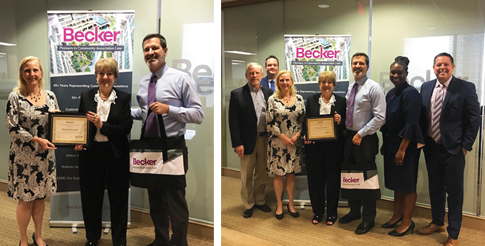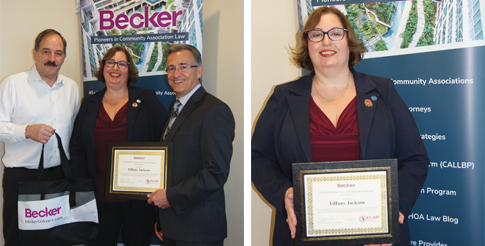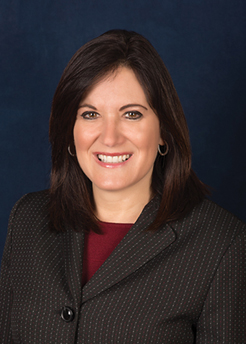
FCAP Community
Published November 2019
Florida Community Association Professionals’ (FCAP) training is offered on two levels. Level one consists of courses meeting Florida’s continuing education requirements for CAMs, and level two is the Florida Advanced CAM Studies (FACS) courses. For further information about the more than 50 online continuing education classes available or to pursue the Certified Florida Community Association Manager (CFCAM) designation, please visit www.fcapgroup.com/membership/education-training/.
 Deborah Carroll
Deborah Carroll
Deborah Carroll of Orlando is the first recipient of the Becker law firm’s CFCAM (Certified Florida Community Association Manager) scholarship. The scholarship is given in recognition of outstanding professionalism in the field of community association management. The CFCAM scholarship will allow Deborah to pursue the 40-hour Florida Advanced CAM Studies course; upon completion of this course, she will obtain the designation of Certified Florida Community Association Manager (CFCAM).
 Tiffany Jackson
Tiffany Jackson
Tiffany Jackson of St. Petersburg is the second recipient of the Becker law firm’s CFCAM (Certified Florida Community Association Manager) scholarship. The scholarship is given in recognition of outstanding professionalism in the field of community association management. The CFCAM scholarship will allow Tiffany to pursue the 40-hour Florida Advanced CAM Studies course; upon completion of this course, she will obtain the designation of Certified Florida Community Association Manager (CFCAM).
Because You Asked
By Betsy Barbieux, CAM, CFCAM, CMCA
Betsy,
I know that it is not required by Chapter 718 or Chapter 720, but do you know if any condominium associations or HOAs send out meeting notices via an email blast to the residents? We currently post our notices in the clubhouse, on nine notice boards on the property, and, of course, on the website. All are posted at an appropriate time as required by that same statute. That should certainly provide ample notice.
However, we have some residents who complain that they did not get the word and ask why we couldn’t send them email notices. We have the capability from our website to send mass email to all residents who have registered on the website. Unfortunately, only about 40 percent of our residents have registered on the website or provided us with their email and permission to contact them electronically. If we were to consider the email notices, could we be accused of excluding the other 60 percent of our residents from receiving meeting notices by a secondary or additional means? Have other associations adopted electronic meeting notices?
– Brad
Brad,
In addition to the official 48-hour posting of board meetings, many communities do send email notices of meetings to owners as a courtesy. Some communities are able to publish the schedule a year in advance of the board meetings so owners can at least mark those dates on their calendars.
The statute only requires U.S. mail or hand delivery for membership annual meetings. However, the statutes do permit for either board meetings or owners’ meetings that owners may opt to receive their notices via email. Owners are responsible for providing updated emails to the association and removing any filters that would block mass emails.
For condominiums, the statute now requires the posting of the notices on the association website if you have more than 150 units. Boards need to remember that these are corporate board meetings, and they are not informational meetings for the owners. The meetings are for the board, not the owners. Please note, there’s a point in time when owners need to be personally responsible for seeking information instead of being spoon fed.
Have you seen my YouTube channel, CAM Matters? The first five episodes offer a lot of information about the purpose of community associations and the meetings. There will be a total of 13 shows on the channel. Be sure and take a look and share with everyone!
– Betsy
Betsy,
My manufactured home park was bought out by another company. Would your HOA board certification manual/course be good for my type of HOA?
– Neil
Neil,
If I understand correctly, you are a rental park, not a community organized under Chapter 718, 719, or 720 of the Florida Statutes but one organized under Chapter 723. The HOA manuals and the cooperative manuals are meant for communities that are not rental parks but are owned either in fee simple or as shares. However, the manuals would have relevant information for meeting procedures, but all of that is still at the discretion of your park landlord.
– Betsy
Betsy,
Do we have to use attorneys to change the number of board members from five to three? We have a very small association with no amenities and very little going on. Also, finding five people to run for the board is almost impossible. A number of us have lived here for a long time and know that this is a thankless job and don’t want it. Please help with any suggestions.
– Kathy
Kathy,
I would need to know what your documents say about changing the number of board members. Some documents allow the board to make the change at a board meeting, but most documents require an amendment which would be voted on by the members at a special (or annual) meeting. Amendments should be reviewed by an attorney to make sure you are not violating another statute or document provision or overlooking unintended consequences.
– Betsy
Betsy,
Here’s my question: For Florida HOAs, is a board member allowed to serve as a chairman of a committee other than the nominating committee, such as the landscape committee or architectural control committee (ACC)? I think we may be in violation, but I want to be sure before I say anything at the next meeting.
– Denise
Denise,
The answer would be driven by your documents. Otherwise, Chapter 617 has some guidance for you. I am not aware of anything in Chapter 720 related to formation or powers of committees.
Section 617.0825 Committees.—
(1) Unless the articles of incorporation or the bylaws otherwise provide, the board of directors, by resolution adopted by a majority of the full board of directors, may designate from among its members an executive committee and one or more other committees each of which, to the extent provided in such resolution or in the articles of incorporation or the bylaws of the corporation, shall have and may exercise all the authority of the board of directors, except that no such committee shall have the authority to:
(a) Approve or recommend to members actions or proposals required by this act to be approved by members.
(b) Fill vacancies on the board of directors or any committee thereof.
(c) Adopt, amend, or repeal the bylaws.
(2) Unless the articles of incorporation or the bylaws provide otherwise, ss. 617.0820, 617.0822, 617.0823, and 617.0824, which govern meetings, notice and waiver of notice, and quorum and voting requirements of the board of directors, apply to committees and their members as well.
(3) Each committee must have two or more members who serve at the pleasure of the board of directors. The board, by resolution adopted in accordance with subsection (1), may designate one or more directors as alternate members of any such committee who may act in the place and stead of any absent member or members at any meeting of such committee.
(4) Neither the designation of any such committee, the delegation thereto of authority, nor action by such committee pursuant to such authority shall alone constitute compliance by any member of the board of directors not a member of the committee in question with his or her responsibility to act in good faith, in a manner he or she reasonably believes to be in the best interests of the corporation, and with such care as an ordinarily prudent person in a like position would use under similar circumstances.
– Betsy
CAM to CAM
Understanding Your Boards and Owners—Financial Planning for Future Condominium Projects
Marcy L. Kravit, CMCA, AMS, PCAM, CFCAM
Florida Community Association Professionals (FCAP) Education and Training Coordinator
AKAM On-Site Managing Director
While many people buy condominiums to avoid the perceived maintenance costs required with a single-family home, they are often unaware of the need for funding major repairs, upgrades, and renovations. Shortly after they move in, they soon learn and discover the need to maintain the asset and at times may not agree with the ways in which the association is being operated. They may have a specific vision, mission, or agenda they wish to address and accomplish. For a variety of reasons, many unit owners will volunteer to serve on the board of directors to ensure the community is well maintained.
Board members are usually elected because they are or are perceived as “movers and shakers.” They have the abil-ity to get things done. The board defines the overall goals of the association and communicates them to management. Some boards and/or specific members tend to micro-manage aspects of the associations, while others are very hands-off and rely more heavily on the professionals. Regardless, it is ultimately the board’s and management’s fiduciary duty to take reasonable steps to maintain the property and ensure proper funding.
As managers, we hear this a lot… “The association cannot afford…”
Answer: Always be prepared, if possible, with responsible value engineering alternatives for the board to consider, or hire an engineer, experts, or consultants to provide an overall inspection and assessment of the property in order to prioritize the action items and obtain costs and a strategic plan for repairs and replacements. If the financial situation is an issue, obtain financing options and meet with your CPA and lenders familiar with condominium associations.
The association’s budget is a financial plan for the association. It provides an estimate of the community’s income and expenses for a specified period of time, usually a year at a time, and is the first step in the community’s financial operations. It establishes what services and programs the association will provide, when they will be performed, and how they will be performed.
Reserve studies allow the board to properly plan ahead and maintain and allocate costs for those larger-ticket items. The reserve study should provide information regarding the useful and remaining life expectancies and replacement costs of the major systems and components the association is obligated to repair, replace, restore, and/or maintain.
If an association is lacking reserves for larger-ticket items or hasn’t kept up with the collection of maintenance assessments from its members, or has charged insufficient or unrealistic maintenance assessments, it could mean a huge increase in fees or a one-time special assessment to fund the large projects and failing building components.
Chapter 718, Florida State Statutes, requires that reserves be established for certain items, including roof replacement, building painting, pavement resurfacing, and any other item of capital expenditure or deferred maintenance that exceeds $10,000. However, many associations vote to waive reserves, forcing assessments or debt for large projects. All of these factors influence the buying habits and buying power of associations.
Becoming involved at the budgeting or reserve study stage with an association will increase the likelihood of your involvement with planning for the future. When the board decides to proceed with major projects, they should hire an engineer to prepare a specification and statement of work.
Buildings managed by a management company obviously receive additional support from experienced executives who are familiar with the dynamics and challenges associations face in addressing major projects, have established relationships, and have the background to recommend firms that are reputable. Professional management companies advise the board in accomplishing the association’s goals by providing expertise, knowledge, experience, and guidance in order for the board to be successful!
Self-managed buildings do not have the resources for additional support and may want to consider hiring a management company or an outside firm or consultant.
One of the most common means of paying for major projects is by the passing of a special assessment on members by the board. If this is how your board plans to pay for a project, it is important to recommend they review the Declaration of Condominium, Articles of Incorporation, and By-Laws (“Condominium Documents”) with the association attorney before doing so. It is a common misunderstanding that the Florida Condominium Act authorizes the board to levy special assessments. This is not always true, and if this issue comes up too late in the process, it could stop a project in its tracks. Chapter 718, Florida Statutes, states that special assessments must be levied as provided in the condominium documents.
Some condominium documents require membership approval for special assessments, so unit owner approval must be obtained. Some documents do not authorize special assessments at all, but only assessments for “emergencies.” Many documents conflict, providing that the board has the authority in one area of the documents and requiring a unit owner vote in another section. Most condominium documents provide that the board of directors has the authority to levy a special assessment.
The association will be required to follow the procedures in the condominium documents unless they are in violation of the minimum standards in Chapter 718, Florida Statutes. Assuming that the board can levy special assessments, the notice of the special assessment meeting is governed by very specific notice procedures, which are stated in Section 718.112(2)(c). The board meeting notice where the special assessment will be considered must be mailed to each unit owner at least 14 days in advance of the board meeting and also posted in a conspicuous place on the property. The notice must state that a special assessment will be considered, the nature of the special assessment, and details regarding the special assessment.
When the board meets and levies the special assessment, the assessment is generally set at a fixed amount. The board must then send out a second notice, this one being required by Section 718.116(10) of the Florida Statutes. Essentially, this notice must notify the owners that a special assessment has been levied, the purpose of the special assessment, and the due dates for payment.
Many associations provide for installment payment options for their members. These are sometimes tied to anticipated progress payments—in other cases, the project is not able to begin until the entire assessment is collected. Special assessment funds, once collected, cannot be used for any purpose other than that for which the special assessment is levied (except that when the project is over, leftover monies can often be applied as a credit toward future unit owner assessments).
A second common payment option is to use “reserve” funds to pay for some or all of the work. Boards should be encouraged to consult with their attorney on how the reserves may be used and whether they are restricted to the restoration/preservation project. If the money is in a “statutory” reserve account, for example, the association cannot use the funds without a unit owner vote (except that painting reserves can probably be applied to most waterproofing projects). The use of other “restricted” reserves, however, must be approved in advance by a vote of a majority of all units. “Pooled” reserves give the association the flexibility on how the funds will be spent and allows for projects to be completed in the order of the need for any of the capital improvements/reserve assets as the time arises. Boards need to be prudent and not overspend on a certain reserve asset.
The third financing option is a loan or line of credit from a bank or financing through the contractor. Although some associations are desirous of using bank or contractor financing as a method of easing the burden of special assessments, the reality is that interest costs are added to the job.
Unit owners who desire financing, or who need financing due to their own constraints to pay the assessment, can seek out their options.
It is always recommended to consult with the association attorney when seeking to fund and contract for these types of projects. It is important that the association and management always be transparent when it comes to communicating the financial health and state of the association and plan for long-term sustainability. Residents need to be informed, and management and the board need to get a “pulse” on the community’s finances. Be prepared for those unforeseen repairs and replacements. A rule of thumb is that associations should reserve at least 70 percent as per the reserve study, and ideally 100 percent would reduce the need for special assessments. Investments such as no risk CDs, CDARS programs, and money market accounts can also provide interest on the reserve accounts.
Keep in mind that poor financial planning for future projects, repairs, and replacements makes it challenging for potential buyers and existing owners who wish to sell their units. It is important for boards to understand that at some point in time the painting, concrete structures, elevators, windows, generator, roof, HVAC equipment, plumbing, electrical systems, swimming pool, parking garages, interior décor, etc. will need to be addressed, and the collection of monthly operating funds will not cover it.





